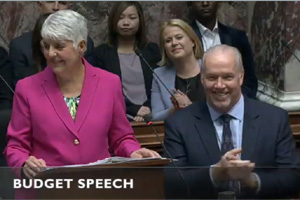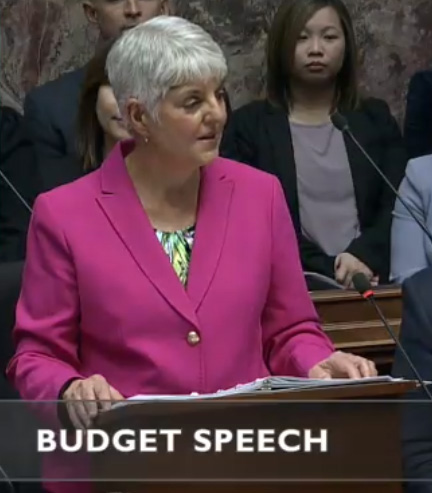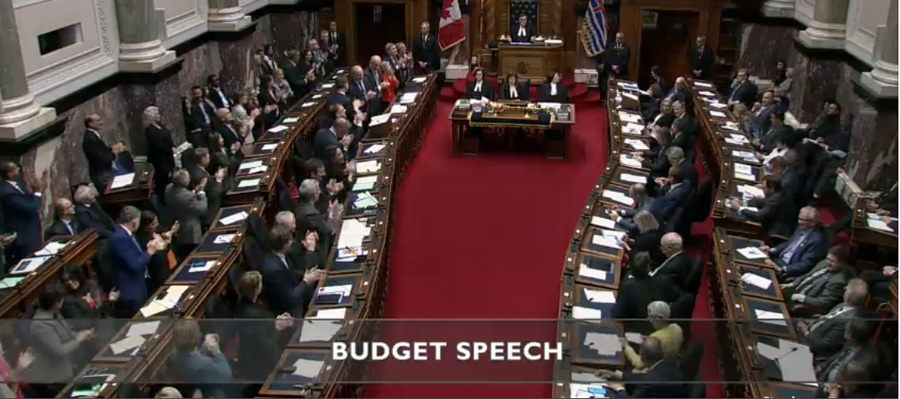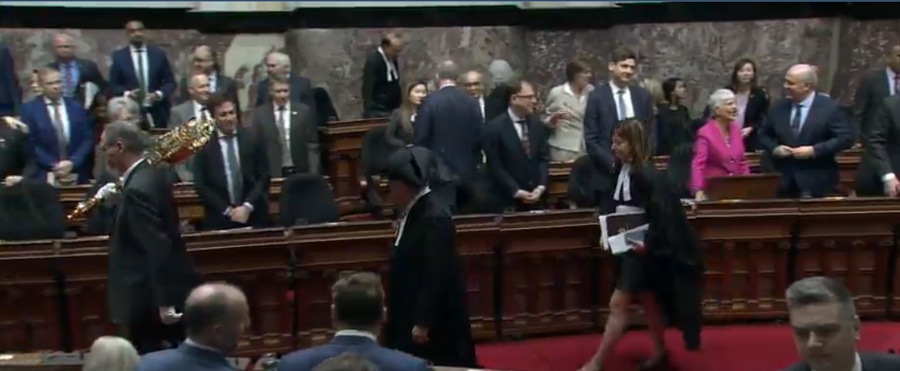
Tuesday February 18, 2020 ~ VICTORIA, BC
by Mary P Brooke ~ West Shore Voice News
The BC Government’s third full budget was delivered today February 18, 2020 by Finance Minister Carole James in the BC Legislative Assembly.
This far into the NDP government mandate under Premier John Horgan, there were few surprises about the direction of Budget 2020. The overall goal is to provide better, more and consistent access for British Columbians to underpin greater affordability and opportunity.
As such, this is probably a gratifying budget for Horgan and James, as they turn the corner into pre-election season.
Components of that philosophy are the cost of education, housing, and child care, with additional underpinning for persons with low-income and disability support.

EDUCATION: Notable is a new access grant for post-secondary students and the elimination of all interest on BC Student Loans. Building on the elimination of interest on B.C. student loans, the new needs-based, up-front BC Access Grant will remove barriers to education and provide support for learners to complete their studies.
In time for the 2020 fall semester, more than 40,000 eligible students at public colleges and universities throughout the province will receive immediate support with the up-front costs of their education.
The BC Access Grant complements the Canada Student Grant for Full-time Students, ensuring BC students receive up to $4,000 a year to help with the cost of programs leading to a degree, diploma or certificate. Starting in September 2020, eligible students applying for student financial assistance from StudentAid BC will be automatically assessed for the BC Access Grant. Students won’t need to apply separately.
Launching the Provincial Tuition Waiver Program for former youth in care to access free tuition at all 25 public post-secondary institutions. To date, more than 1,100 former youth in care have benefited.
Eliminating interest on B.C. student loans will save a typical student who graduates with about $28,000 in combined BC and federal student loans $2,300 in interest charges over a 10-year repayment period.

Supporting safe and state-of-the-art learning environments including more on-campus housing, 11 new and improved trades, health-care and engineering training facilities , and new, 24/7, free mental-health helpline for students at all public and private post-secondary institutions. Sexual violence prevention programs will be developed at post-secondary institutions.
- $42 million will be provided annually by 2022-23 to add 2,900 tech spaces for a range of technology programming at public post-secondary institutions throughout BC.
- Approximately $30 million will be invested overall to expand co-op and work-integrated learning in each of BC’s 25 public post-secondary institutions.
To help bolster the continued need for quality child care in BC, the budget ads 314 early childhood education (ECE) spaces at 12 post-secondary institutions as part of a three-year, $7.4 million investment.
Over the next 10 years, 77% of all job openings will require post-secondary education and training: 41% will require a certificate or diploma and 36% will require an undergraduate or master’s degree.
INFRASTRUCTURE: Budget 2020 makes new capital commitments by bringing taxpayer-supported capital spending over three years to $22.9 billion – the highest level in BC’s history. Investments over the three-year fiscal plan period include:
- Health: $6.4 billion to support new construction projects and upgrading of health facilities, medical and diagnostic equipment, and information management systems. Major projects include redevelopment of the Royal Columbian Hospital in New Westminster, new patient care towers at the Royal Inland Hospital in Kamloops and the Penticton Regional Hospital, replacing Mills Memorial Hospital in Terrace and building a new St. Paul’s Hospital in Vancouver.
- Transportation: $7.4 billion for priority projects, including the Pattullo Bridge replacement, the Broadway Subway, four-laning on Highway 1 through Kicking Horse Canyon and improvements to highway corridors in Delta, Langley and along the southern coast of Vancouver Island.
- Education: $2.8 billion to maintain, replace, renovate or expand K-12 facilities in North Vancouver, Sooke School District, Quesnel, Coquitlam, the Greater Victoria School District, Vancouver, Abbotsford and an addition to Valleyview Secondary in Kamloops. Many of these new and upgraded schools will also include neighbourhood learning centres and child care spaces.
- Post-secondary education: $3.1 billion to build capacity and help meet the province’s future workforce needs in key sectors, including health, science, trades and technology. Projects include a new health science building for students at the British Columbia Institute of Technology in Burnaby; new equipment to expand the CEDAR supercomputer at Burnaby’s Simon Fraser University; and specialized equipment at the University of British Columbia’s Vancouver campus, Vancouver General Hospital and BC Cancer Research Centre to support the development of personalized treatments for prostate, bladder and kidney cancers. Additionally, the provincial student housing loan program will see approximately 5,000 new student housing beds built around B.C., from Terrace to Cranbrook, and Prince George to Victoria.
- Housing: As part of government’s 10-year plan to work in partnership to create more affordable housing for British Columbians, more than $1 billion over three years will support the construction of new low- and middle-income housing throughout B.C. This includes more housing for seniors, Indigenous peoples and families. Budget 2020 also provides an additional $56 million for 200 new units of supportive modular housing for people who are homeless or at risk of homelessness.
CHILD CARE: Families will receive sizable child deductions for each child up to the age of 18. More education of early childhood education spaces will help increase ECE worker supply.
INDIGENOUS RIGHTS & INITIATIVES: Through the BC First Nations Gaming Revenue Sharing Limited Partnership, $100 million per year is going to all First Nations communities in B.C. to pursue their own priorities and serve the needs of their communities.
Work is already underway or completed under this program to offer high-speed internet access to 83 Indigenous communities in British Columbia.
Physical connectivity is as important as digital connectivity, which is why the Province is working with the federal government to maintain BC Bus North services. Government is also offering driver training to people in Indigenous communities, recognizing that the ability to get around is critical, especially for Indigenous peoples living in rural and remote communities.
Instead of taking children away because families need help, a new, collaborative approach involves service providers working closely with parents to identify and provide the supports they need to give their children a healthy start.
BC is the first and only provincial government to fund on-reserve housing. Nearly 1,200 new affordable homes are underway through this program.
OVERALL BUDGET: The budget is balanced in all three years of the fiscal plan with surpluses of $227 million in 2020-21, $179 million in 2021-22, and $374 million in 2022-23.
Last year, BC’s economy was among the top of the provincial real gross domestic product (GDP) growth rankings, led the country with the lowest unemployment rate, and was among the leaders in employment growth across Canada.
Minister James announced that an additional one percent in tax will be levied on person’s in BC who earn over $1 million per year. This is the government’s main approach to finding more revenue to cover their investments in the services to help British Columbians achieve lifestyle stability.

She noted that the government dealing with money laundering in BC is a way to clean up the financial health of the province.
British Columbia is projected to continue to be among the top of the provincial real GDP growth rankings in 2020 and 2021.
Between 2001 and 2019, BC’s population grew by nearly one million people, with much of the increase concentrated in the Lower Mainland. By 2024, BC’s population is expected to grow by approximately 346,000 people and by more than one million people in the next 15 years.
LEGISLATIVE CHANGES: In future years, the BC government’s budget will be delivered by the third week in March (instead of third week in February) as a way for a newly elected or re-elected government to have 120 days (not 90) to prepare a budget. Election dates are fixed in BC as for the third Saturday in October. The next election is set for October 16, 2021.
==== LINKS:
Government News Release on Budget 2020, with backgrounders


